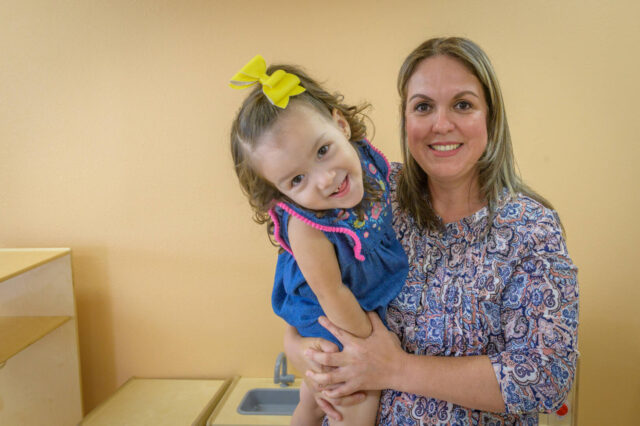When Danny Huerta’s son told him that he wanted to be like Michael Jordan when he grew up, Danny didn’t think much of it. But a couple years later, his son had a new goal.
“He said, ‘Dad, I don’t want to be Michael Jordan anymore — I want to be like you,’” Danny says.
The moment deeply impacted Danny, a licensed clinical social worker with his own practice and executive director of parenting and youth at Focus on the Family in Colorado Springs. Despite all his training and experience, he truly realized then how important it is to spiritually equip his children.
“Our teaching and impact matters,” he says. “Our children are wanting something. They’re watching. They want to follow something, and that’s why God made parents — because we get to be an extension of Him to our kids. We get to provide that, and if we don’t, they’re still looking for it, and someone else will have that spot. That’s why God calls us as parents to take ownership of that spot.”
That becomes even more important as children head back to school and are surrounded by myriad ideas and messages about their values and themselves.
“We live in a culture where you have to be prepared to give an answer to what you believe,” Danny says. “What I like to teach my own kids and kids in my counseling practice is how you think about your thinking.
“When kids learn how to observe their thinking, they learn how to take inputs and how to discern what’s right and what’s wrong.”
We spoke with Danny about how to train your children to build their own beliefs and spiritually equip them as they return to the classroom this fall.
How do parents get kids to form their own spiritual beliefs?
Parents can help their kids learn the spiritual side by explaining why they believe what they believe — not just that we believe in God. Ask and explain:
- Why do we believe in God?
- What does that belief mean in how we treat each other and how we treat others?
- How does that belief influence how we run our home, how we choose our activities, how we choose movies, how we choose music, and so on?
Let them see how belief influences every aspect of a person’s life. That can start as early as age 7. A lot of times we think they’re too young, but that’s a mistake.
The next step would be to have them think about, ‘From what I’m thinking and seeing about what my family believes, what are my values and beliefs, and why?’ Even from a young age, have kids form an opinion so they don’t feel like they’ve just been fed an opinion from their parents. Ask them, ‘Is there another way to look at this?’ Spiritually speaking, prepare them and equip them to know that people form different opinions, and we have to have the flexibility of mind to see things from different angles but still hold our opinion and belief.
How can parents help children think about those other beliefs and how others think?
There are some teachings that would be helpful for parents to have as they spiritually equip and strengthen their kids for the school year coming up, and then it’s having those discussions all year long.
1. Help them learn how to practice kindness. What does it mean to be kind, and why is that important? Have them do experiments. Say, ‘Let’s observe: when someone is kind, how does that make someone feel? When someone is kind to you, what does that feel like? Is that how you would like to influence someone else’s feeling?’ Help them learn that ‘what I choose to do influences the feelings of another person.’
2. Teach them the discipline of listening. How can you actually listen to another person, and why is that important? If we look at how Jesus treated people who opposed him, he listened first, and then he responded. He didn’t react. You can go to many examples in Scripture on how to listen first and then respond. By listening, you gain wisdom, and through wisdom, you’re able to be listened to.
I show kids a picture of an iceberg. You can see a person, but you see just the tip of the iceberg. But when you get down below the surface of the water, there’s a huge iceberg. It’s learning that there’s much more to a person than what’s on the outside, and it takes a while to get to the depths of the ocean where you see the full deal. Explain that when you listen, you’re going deep into the ocean. We all want to be known, so let’s take turns knowing each other.
To listen requires patience, and it requires being able to pay attention. With kids, I say, ‘You have to see a stop sign. If you run the stop sign, you run into people.’ Once you’re in the intersection, it’s your turn to talk, and if someone intersects you, you get to say, ‘You just ran into my car.’ It can have some humor or playfulness, and the other person gets it.
3. Help them learn empathy. Another way of looking at this is putting yourself in another person’s shoes, but it’s taking it a step further and feeling what they feel according to what their story is — if that happened to me, how would I feel, and how would I think? That way, I can feel the other person and have authenticity and genuineness with the person rather than a pressure to do something or feel some way because I should.
So kids are thinking about their thinking and others’ thinking, but how do parents help children think about God’s thinking and what Scripture passages help them do that?
1. I love for families to discuss Colossians 3. It talks about the clothing of the new Christian. What does that look like? We talk about putting on the clothing to prepare for the day. Then in Ephesians, it talks about putting on the armor of God. Then in Philippians 4:8, it talks about the way to think. After you put all that into practice, then you have the fruits of the spirit that come out, so it’s learning what those are — how can we have peace in the middle of chaos? How can we have kindness when people are unkind? How can we have love when people are unloving? Have a deep discussion about those things so you can handle anxiety as it comes on.
2. One of the foundations I go to is Ephesians 2:10, where it says that we are God’s masterpiece, and we have been created to do good things that have been prepared ahead of time for us to walk into. For kids, have that be a theme verse: ‘Okay, I’m created to do good things, so what are those good things I was created to do? What can I do at school? Those have been created for me to do, but first I have to understand I’m God’s workmanship — that prepares me spiritually. The only one who gets to vote on who I am is God; he’s already said that I’m his masterpiece.’ It’s learning that solid identity so they can walk, spiritually strong, into a place where there’s going to be a lot of people telling them, ‘You’re not good enough,’ or, ‘There’s something wrong with you.’
3. Then the last piece is to learn how to observe and discuss what trust is — trust and satisfaction is that contentment piece. It tells us in Ezekiel 28 that Satan had everything, yet he wanted more. The lack of satisfaction and contentment and the lack of trust toward God is really what wreaked havoc on his heart. Then he took the same tactics to Adam and Eve — ‘Hey, did God really say that?’ He brought them a questioning of God. Once that trust came into question, they weren’t satisfied with what they had, and they wanted more. If you look at what sin does, it starts off subtly — we don’t trust, and we can’t find satisfaction or contentment.
Gratitude is a big focus to counter that. The exercise I love for families to do together is looking at needs and wants. What has gotten into the need category that’s really a want? If it’s gotten into the need category, why has it gotten there? Is it an identity issue? Do I need love? Do I need acceptance? If it’s a need, why is me being God’s workmanship and created to do good things not enough?
Teach kids that yes, it’s normal and not bad that you want to be loved and accepted — that’s a hunger within a person. But as a parent, you’re teaching them how to manage and understand that: ‘If you have more things, would more people love and accept you? Or will it be an endless pursuit where you’re going to be constantly thirsty?’ I’d rather go to whatever quenches my thirst. If I’m out in a desert, and I’m drinking a lot of pop, it feels good, but it’s going to dehydrate me. But if I drink water, it may not immediately taste good, but it will quench the thirst, and over time it will feel good and eventually save my life.
How often should parents have these conversations with their kids?
Fit it naturally into the day so that it feels conversational rather than, ‘Okay, I got this off our list.’ When things come up on the news or at school, refer back to these conversations. Just because you went over it once, you don’t check it off the list. A lot of times, kids hear about something and listen, but then they move on. They want to go play or do something else, so you have to come back to it. The more you force it, the more they don’t want to talk about it — ‘Man this isn’t fun. It’s going to be a lecture for 35 minutes. I’m supposed to take notes.’ It has to become more conversational, and recognize some conversations may be 30 seconds, and some may be two hours.
Work on it all year long, knowing there’s going to be a tremendous amount of imperfection. Knowing what you’re facing and planning ahead is important. There may be a difficult topic for a teen that they’ll be going into, so you may say, ‘Okay, let’s focus on what we’ve been talking about.’ It’s equipping them and helping them practice. If you play basketball and have an opponent that’s going to be more difficult, you have to practice harder for that.
During these conversations, how can parents stay calm if kids say things that counter their beliefs?
Emotions are normal. I can’t say, ‘Don’t freak out,’ because a parent is going to freak out, but know your emotions and what you’re feeling in that moment. If you feel completely freaked out, go to the bathroom and say you’ll be right back. Even if you don’t have to go, sit in there for a moment, take a deep breath, and pray. Say, ‘Lord, you heard this. This is your child — I’m just here as an extension of you, and I need you. Lord, I want to respond right.’
If you react in that moment, almost 100% of the time, you’re going to say the wrong thing, and that creates more division. It’s regrouping and thinking about your own thinking. Emotions create blindness, and you start lose sight of your child — the person he or she is. You want to come from the perspective of your child — they’re being taught a lot of different things, and it can be confusing — so having compassion toward your child is a key component.
Ask more questions than you do in offering defenses. Listen, absorb, and help them think about their thinking. Ask them:
- How did you come up with that new belief or view?
- Where did you get that information?
- How did you decide it was truth?
Then you say to them, ‘Now let’s overlay that with Bible truth.’ Then ask:
- How does that play out?
- How do you know that is true?
- Is that an honorable type of view or belief?
- If that were true, what does that say about us? About our world? About you?
Those questions are helpful so the child is thinking more critically. Step into that knowing you may not convince them. But the more you’re managing yourself, modeling love, solid in your faith, and able to state what you believe, then the more impact you’ll have on your child because they’re watching that.
If you start being anxious, what does that say about your belief about who God is? Is God someone who is able to really change people’s hearts? Do I believe there is a God who will pursue his children relentlessly? Jesus made that case — here’s the 99 sheep, but I’m going to go after that one sheep that’s wandered away. So do I really believe that? That’s where you’re going to pray more than you’ve ever prayed before for your child to see that clearly.
It’s not about being a perfect parent. It’s doing the best you can with what you have. There isn’t a formula to magically create perfect kids. That’s why we need God, and we have to teach kids about that dependency and need for God and that we can’t create our own perfection.


